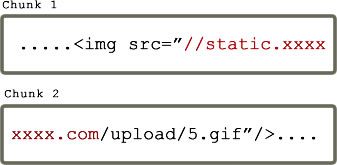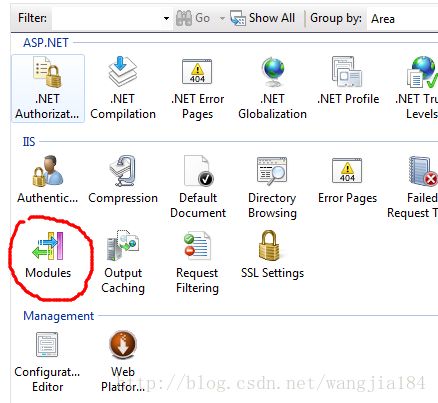IIS7+ 中通过Native HttpModule修改HTML
原文地址: http://blog.csdn.net/wangjia184/article/details/17919667
突然来了这样一个任务:当用户从非欧洲外国家访问时,采用CDNetworks;而该CDN流量费过于昂贵,当用户从欧洲访问的时候要求采用欧洲本地另一个CDN。为了避免改动太多现有代码,最简单的方式就是通过HttpModule在IIS服务器返回HTTP响应前对查找到内容中的资源url域名并进行替换。
这个问题初看上去很简单,但其实上有很多麻烦。
原文地址: http://blog.csdn.net/wangjia184/article/details/17919667
1. 分隔的chunk
服务器在返回的时候是将响应分隔成了多个chunk,那么有可能目标字符串被分隔到了2个chunk中。
例如,//static.xxxxxxxx.com是查找的目标字符串,可能分布成下图的情况,这给查找带来了很大的不便。
2. 性能
因为这个处理过程会针对所有响应触发,因此应该采用最高效的方式实现,否则对性能的影响很严重。
在Rick Strahl的《Capturing and Transforming ASP.NET Output with Response.Filter》一文中,为了解决第一个问题,他采用托管的HttpModule, 在将多个chunk合并到一起后再进行处理。这样虽然解决了问题,但是对性能造成很大的不利影响。实际上如果某个chunk中没有出现目标字符串的情况下可以完全不用进行处理。
其次,对于字符串的查找可以使用更高效的Boyer-Moore算法。
最后,我决定使用非托管代码实现,这样的话效率是最高的。
工程搭建.
从IIS7开始,非托管Module从以前的ISAPI变成了C++ Module, 首先下载
IIS7 Native API (C++) Starter Kit
HRESULT
__stdcall
RegisterModule(
DWORD dwServerVersion,
IHttpModuleRegistrationInfo * pModuleInfo,
IHttpServer * pHttpServer
)
{
HRESULT hr = S_OK;
CPostProcessHttpModuleFactory * pFactory = NULL;
if ( pModuleInfo == NULL || pHttpServer == NULL )
{
hr = HRESULT_FROM_WIN32( ERROR_INVALID_PARAMETER );
goto Finished;
}
// step 1: save the IHttpServer and the module context id for future use
g_pModuleContext = pModuleInfo->GetId();
g_pHttpServer = pHttpServer;
// step 2: create the module factory
pFactory = new CPostProcessHttpModuleFactory();
if ( pFactory == NULL )
{
hr = HRESULT_FROM_WIN32( ERROR_NOT_ENOUGH_MEMORY );
goto Finished;
}
// step 3: register for server events
// TODO: register for more server events here
hr = pModuleInfo->SetRequestNotifications( pFactory, /* module factory */
RQ_SEND_RESPONSE /* server event mask */,
0 /* server post event mask */);
if ( FAILED( hr ) )
{
goto Finished;
}
pFactory = NULL;
Finished:
if ( pFactory != NULL )
{
delete pFactory;
pFactory = NULL;
}
return hr;
}
其中最重要的是 SetRequestNotifications 的调用,它注册需要处理的事件。这里你需要了解在integrated pipeline模式下 各事件的含义及触发顺序。因为需要修改返回,注册对 RQ_SEND_RESPONSE消息的侦听就可以了。
然后在CHttpModule的派生类中,重载OnSendResponse方法
class CPostProcessHttpModule : public CHttpModule
{
public:
REQUEST_NOTIFICATION_STATUS
OnSendResponse(
IN IHttpContext * pHttpContext,
IN ISendResponseProvider * pProvider
);
private:
BOOL StringStartsWith(LPCSTR szText, LPCSTR szPrefix, int nMaxLength = 1024000);
};
REQUEST_NOTIFICATION_STATUS
CPostProcessHttpModule::OnSendResponse(
IN IHttpContext * pHttpContext,
IN ISendResponseProvider * pProvider
)
{
UNREFERENCED_PARAMETER( pHttpContext );
UNREFERENCED_PARAMETER( pProvider );
return RQ_NOTIFICATION_CONTINUE;
}
工程到这里就搭建完成了
安装与卸载
%systemroot%\system32\inetsrv\APPCMD.EXE install module /name:HtmlPostProcessModule /image:G:\IISPostProcessModule\bin\PostProcessModule_x64.dll /add:false/image: dll的绝对路径
在Modules中,点击Configure Native Modules, 在弹出窗口中,勾上刚安装的module,这样就可以了。
如果要卸载,可以使用如下命令
%systemroot%\system32\inetsrv\APPCMD.EXE uninstall module HtmlPostProcessModule其中HtmlPostProcessModule是安装的时候给的module name.
获得HTTP返回
当服务器返回请求的时候,OnSendResponse函数会被调用。通过下面的代码可以遍历所有的chunk
REQUEST_NOTIFICATION_STATUS
CPostProcessHttpModule::OnSendResponse(
IN IHttpContext * pHttpContext,
IN ISendResponseProvider * pProvider
){
IHttpResponse * pHttpResponse = pHttpContext->GetResponse();
if( pHttpContext ){
HTTP_RESPONSE *pResponseStruct = pHttpResponse->GetRawHttpResponse();
if (pResponseStruct){
for( int i = 0; i < pResponseStruct->EntityChunkCount; i++) {
HTTP_DATA_CHUNK pChunk = &(pResponseStruct->pEntityChunks[i]);
if( pChunk->DataChunkType == HttpDataChunkFromMemory ){
}
// TODO :
}
}
}
}
需要注意的事,实际上ChunkType分很多种,这里只处理了Memory类型的,如果要处理静态文件或者缓存类型的,应该加入相应的代码处理
typedef enum _HTTP_DATA_CHUNK_TYPE
{
HttpDataChunkFromMemory,
HttpDataChunkFromFileHandle,
HttpDataChunkFromFragmentCache,
HttpDataChunkFromFragmentCacheEx,
HttpDataChunkMaximum
} HTTP_DATA_CHUNK_TYPE, *PHTTP_DATA_CHUNK_TYPE;
查找目标字符串
对目标字符串采用最高效的BM算法查找,boost准标准库中已经有现成的实现了,直接用即可。
#include <boost\algorithm\searching\boyer_moore.hpp>
// the search target
char * szPattern = "//static.xxxxxxxx.com";
const int PATTERN_SIZE = strlen(szPattern);
boost::algorithm::boyer_moore<char*> bm( szPattern, szPattern + PATTERN_SIZE );
char * pStart = (char *)pChunk->FromMemory.pBuffer;
char * pEnd = pStart + pChunk->FromMemory.BufferLength;
// find out all the appearances
char * pMatch = pStart;
for(;;){
pMatch = bm( pMatch, pEnd);
if( !pMatch || pMatch >= pEnd )
break;
// TO DO:
// pMatch is the matched address of the string
pMatch += PATTERN_SIZE;
if( pMatch >= pEnd )
break;
}
处理多个Chunk的问题
// detect if there could be uncompleted partner at the end of this chunk
int nChunkRemaingChars = 0;
if( i < pResponseStruct->EntityChunkCount - 1 ){
int j = PATTERN_SIZE - 1;
for( ; j > 0; j--){
char * pFirst = &pStart[pChunk->FromMemory.BufferLength - j];
if( StringStartsWith( pFirst, szPattern, j) ){
nChunkRemaingChars = j;
dwNewSize -= nChunkRemaingChars; // the end part is moved to next chunk to process
break;
}
}
}
修改Chunk
LPBYTE pBuffer = (LPBYTE)pHttpContext->AllocateRequestMemory(dwNewSize); // TODO : modify the new chunk // Set back the new chunk point pChunk->FromMemory.pBuffer = pBuffer; pChunk->FromMemory.BufferLength = dwNewSize;这里没有使用 WriteEntityChunks方法来写入新的Chunk,而是直接修改。MSDN上说使用该方法一个chunk的大小最大只能为65534。 而通过直接修改chunk的方法,我测试过,一次写入650K都不成问题。
核心部分完成代码
BOOL CPostProcessHttpModule::StringStartsWith(LPCSTR szText, LPCSTR szPrefix, int nMaxLength /* = 1024000 */)
{
for( int i = 0; i < nMaxLength; i++){
if( szPrefix[i] == 0 )
return TRUE;
if( szText[i] != szPrefix[i] )
return FALSE;
}
return TRUE;
}
REQUEST_NOTIFICATION_STATUS
CPostProcessHttpModule::OnSendResponse(
IN IHttpContext * pHttpContext,
IN ISendResponseProvider * pProvider
)
{
UNREFERENCED_PARAMETER( pHttpContext );
UNREFERENCED_PARAMETER( pProvider );
IHttpResponse * pHttpResponse = pHttpContext->GetResponse();
if( pHttpContext )
{
pHttpResponse->WriteEntityChunks
HTTP_RESPONSE *pResponseStruct = pHttpResponse->GetRawHttpResponse();
if (pResponseStruct)
{
PCSTR pszContentType;
USHORT cchContentType;
pszContentType = pHttpResponse->GetHeader( HttpHeaderContentType, &cchContentType);
if( pszContentType )
{
if( StringStartsWith( pszContentType, "application/json") ||
StringStartsWith( pszContentType, "text/html") )
{
char * szPattern = "//static.xxxxxxxx.com";
char * szReplace = "//cdn.xxxxxxxx.com";
const int PATTERN_SIZE = strlen(szPattern);
const int REPLACE_SIZE = strlen(szReplace);
int nLastChunkChars = 0;
boost::algorithm::boyer_moore<char*> bm( szPattern, szPattern + PATTERN_SIZE );
for( int i = 0; i < pResponseStruct->EntityChunkCount; i++)
{
std::vector<int> lstAppearance;
char * pStart = NULL; char * pEnd = NULL;
PHTTP_DATA_CHUNK pChunk = &(pResponseStruct->pEntityChunks[i]);
if( pChunk->DataChunkType == HttpDataChunkFromMemory )
{
if( pChunk->FromMemory.BufferLength > 0 ) {
pStart = (char *)pChunk->FromMemory.pBuffer;
pEnd = pStart + pChunk->FromMemory.BufferLength;
// caculate the new buffer size
BOOL bHasUncompletedPartner = FALSE;
DWORD dwNewSize = pChunk->FromMemory.BufferLength;
BOOL bRequireModification = FALSE; // flag indicating if this chunk need be modified
// if there is uncompleted partner from the end of last chunk
if( nLastChunkChars > 0 ){
// detect if (the end of last chunk + start of this chunk) matches the partner
if( StringStartsWith( pStart, szPattern + nLastChunkChars, PATTERN_SIZE - nLastChunkChars) ){
bHasUncompletedPartner = TRUE;
dwNewSize = dwNewSize - (PATTERN_SIZE - nLastChunkChars) + REPLACE_SIZE;
}
else{
dwNewSize += nLastChunkChars;
}
bRequireModification = TRUE;
}
// find out all the appearances
char * pMatch = pStart;
if( bHasUncompletedPartner )
pMatch = pMatch + nLastChunkChars; // skip the begin part if (the end of last chunk + start of this chunk) matches the partner
for(;;){
pMatch = bm( pMatch, pEnd);
if( !pMatch || pMatch >= pEnd )
break;
lstAppearance.push_back( (int)(pMatch - pStart) );
pMatch += PATTERN_SIZE;
if( pMatch >= pEnd )
break;
}
if( !lstAppearance.empty() ){
dwNewSize += lstAppearance.size() * ( REPLACE_SIZE - PATTERN_SIZE);
bRequireModification = TRUE;
}
// detect if there could be uncompleted partner at the end of this chunk
int nChunkRemaingChars = 0;
if( i < pResponseStruct->EntityChunkCount - 1 ){
int j = PATTERN_SIZE - 1;
if( lstAppearance.size() > 0 ){
std::vector<int>::iterator iter = lstAppearance.end();
iter--; // the last matched position
int nRemaining = pChunk->FromMemory.BufferLength - ( *iter + PATTERN_SIZE );
if( j > nRemaining )
j = nRemaining;
}
for( ; j > 0; j--){
char * pFirst = &pStart[pChunk->FromMemory.BufferLength - j];
if( StringStartsWith( pFirst, szPattern, j) ){
nChunkRemaingChars = j;
dwNewSize -= nChunkRemaingChars; // the end part is moved to next chunk to process
bRequireModification = TRUE;
break;
}
}
}
if( bRequireModification ) {
LPBYTE pBuffer = (LPBYTE)pHttpContext->AllocateRequestMemory(dwNewSize);
ATLASSERT(pBuffer);
int nOffset = 0; // store the written range of the new buffer
int nLastEnd = 0; // the end position of last match in orginal buffer
if( pBuffer ) {
if( bHasUncompletedPartner ){
// insert the replace text if (the end of last chunk + start of this chunk) matches the partner
memcpy_s( pBuffer, dwNewSize, szReplace, REPLACE_SIZE);
nOffset = REPLACE_SIZE;
nLastEnd = PATTERN_SIZE - nLastChunkChars;
}
else if( nLastChunkChars > 0 ) {
memcpy_s( pBuffer, dwNewSize, szPattern, nLastChunkChars);
nOffset = nLastChunkChars;
}
nLastChunkChars = nChunkRemaingChars;
if( !lstAppearance.empty() ) {
std::vector<int>::iterator iter;
for( iter = lstAppearance.begin(); iter != lstAppearance.end(); iter++) {
int nPos = *iter;
if( nPos > nLastEnd ) {
memcpy_s( pBuffer + nOffset, dwNewSize - nOffset, pStart + nLastEnd, nPos - nLastEnd);
nOffset += nPos - nLastEnd;
}
memcpy_s( pBuffer + nOffset, dwNewSize - nOffset, szReplace, REPLACE_SIZE);
nOffset += REPLACE_SIZE;
nLastEnd = nPos + PATTERN_SIZE;
}
}
if( nOffset < dwNewSize ){
memcpy_s( pBuffer + nOffset, dwNewSize - nOffset, pStart + nLastEnd, dwNewSize - nOffset);
}
pChunk->FromMemory.pBuffer = pBuffer;
pChunk->FromMemory.BufferLength = dwNewSize;
}
}// if( bRequireModification )
}// if( pChunk->FromMemory.BufferLength > 0 )
}// if( pChunk->DataChunkType == HttpDataChunkFromMemory )
}// for( int i = 0; i < pResponseStruct->EntityChunkCount; i++)
}
}
}
}
return RQ_NOTIFICATION_CONTINUE;
}
原文地址: http://blog.csdn.net/wangjia184/article/details/17919667


